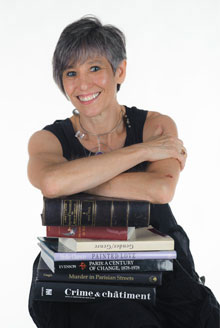 |
|
||||||
|
|
||||||||||||||||||||||||||||||||||||||||||||||||||||||||||||||||||||||||||||||||||||||||||||
|
Sharon Johnson: French Twist
Walking into a room of students eagerly conversing in French about their first week of classes, the professor quickly joined the discussion. She moved excitedly around the classroom throughout the lesson, even fist-pumping after a correct response. In the final minute of Associate Professor Sharon Johnson's Advanced French for Business class on the Friday afternoon before the first weekend of the fall semester, students refrained from the normal rustling of papers and remained attuned to their professor's last words. Johnson's ability to engage her students is only one of the reasons she earned the university's 2011 William E. Wine Award for excellence in teaching. Since joining the Department of Foreign Languages and Literatures in 1998, she has been an active member of the Virginia Tech community. In addition to serving on countless committees and participating in university workshops, seminars, and conferences, Johnson has been instrumental in the development of Tech's French program. "Dr. Johnson's passion for the French language and her deep concern for her students as individuals really pushed me to be the best student I could be during my last year at Virginia Tech," said Lenise Phillips (French and English '11), one of Johnson's recent graduates. "I wanted to be a good student for her, make her proud of me, and ultimately somehow repay the favor she gave me the moment she became my professor and became so selflessly invested in my education." After 31 years of teaching, Johnson knows that the secret to inspiring and engaging students lies in the balance of demanding their very best and genuinely caring for their success. "No student slips through the cracks once they are my student," said Johnson. Johnson takes language instruction well past vocabulary lists and verb drills. In addition to guiding her students through the intricacies of the French language, she teaches courses on many of her research interests, including 19th- and 20th-century literature; gender studies; art history; literary, legal, and medical discourses; cross-cultural pedagogy; and business. The courses are designed to help students analyze complex cultural, societal, and psychological issues and make connections across disciplines. In the spring 2011 semester, students in Johnson's gender course voted to read a type of Japanese graphic novel called manga. In proposing one sub-genre of manga—"yaoi," translated as "boy's love"—Johnson explained to the class that they would explore alternative representations of gendered stereotypes and sexuality because the plots focused on love between two male androgynous characters. Together they would hypothesize as to why French female teenagers were devouring these stories and how they might be constructing the teens' notions of love and desire. "The lesson on [manga] was quite interesting because it allowed us to see and analyze representations of gender in a context distinct from any other presented in the course," said Michael Kozar (French and biochemistry '11). "I found it really helpful to learn about gender using texts that were not purely academic." Cross-cultural exchange is central to Johnson's teaching philosophy. With French colleagues, she developed the Images, Myths, and Realities Across Cultures program, where, by analyzing images and texts pertaining to France and the United States, students shared ideas on selected themes and contemporary cultural issues. The director of Tech's study-abroad program in Paris, Johnson was also influential in the creation of the French business program, a joint venture between the foreign languages department and Pamplin College of Business. Johnson was first exposed to the French language after watching a television show, "Chez Hélène," as a child. Then, in second grade, Johnson's elementary school introduced French into the curriculum. By age 14, she was determined to study abroad in France. She approached her parents with a heavily researched presentation of potential programs and then went on her first study-abroad experience to Strasbourg, France, the following year. During that first trip, Johnson recalls seeing two women, standing near their bicycles, speaking in French. The image impressed upon her that French, more than language confined to a classroom, is a way of life. The trip taught Johnson that the cultural and social experiences she had in her hometown of Bloomfield Hills, Mich., were not the norm worldwide. Johnson continued to visit France whenever possible, learning the joy of embracing her autonomy and taking pleasure in solitude. "France showed me a different way to be a teenager. It gave me a strength and internal fortitude. I feel indebted to France for a lot of my moral and psychological fiber, as well as my intellectual development," Johnson said. Just as France encouraged her growth as an individual, Johnson's enthusiasm is a source of inspiration for her students. "If it [weren't] for [Johnson], I probably would not have graduated with a B.A. in French and would not be pursuing the career I am now," said Stephanie Dunstan (French and political science '09), who dreams of working in international adoption focused in Africa, where her French skills may be put to good use. "It was her encouragement and passion that pushed me. … I know that many years down the road, she will be the professor that I credit for my successes."
|
|
|||||||||||||||||||||||||||||||||||||||||||||||||||||||||||||||||||||||||||||||||||||||||||
|
|


